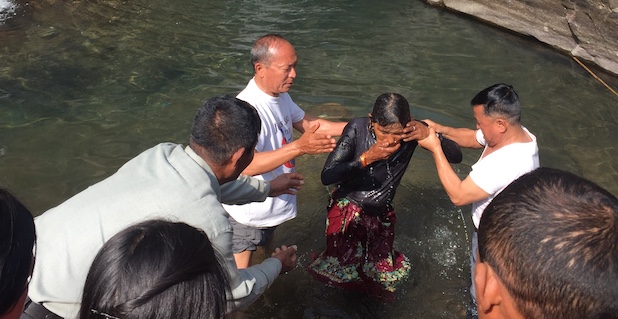When I took a call from our brother, the Rev Rinzi Lama, Dean of the Anglican Church of Nepal, I was struck by his compassion for those who are suffering under the impact of COVID-19. On top of increasing deaths from infections, Nepal is experiencing food shortages, many are jobless, and “people are fearful and searching for hope in their life.” Mr Lama told me, “We are willing to help those who are under crises, therefore we need one another's prayer and generosity.”
So, with Christians around the world asking for help, how should Sydney Anglicans respond? In my work as Anglican Aid’s CEO, I’ve come across Sydney ministers who so prioritise Word-based ministries, that giving to the poor seems almost unthinkable - especially the poor outside Australia.
But of course, I can’t say to Rinzi from Nepal, ‘Go in peace; keep warm and well fed’ (James 2:16). How then, should Sydney Anglicans relate to the poor in Nepal and elsewhere, where (unlike in Australia) government assistance is completely inadequate? With a completely different language, culture, climate, and geography, it can seem as though the Nepalese are almost a world away. Doesn’t such distance disqualify people from our care? This of course is the lawyer’s question in Luke 10 when he asks Jesus, ‘Who is my neighbour?’ He seeks to limit his span of care. But Jesus then tells a parable in which a foreigner - a Samaritan - spends himself on behalf of a needy man he encounters on the road. Jesus’ command? “Go and do likewise”. While the poor in Nepal are not geographically near neighbours, Sydney Anglicans have had a long relationship through CMS missionaries, Anglican Aid, and the Anglican Church of Nepal - a rapidly growing network of evangelical churches. We have encountered them ‘on the road’, and they have begged us for support. Our new Archbishop, Kanishka Raffel told me the story of visiting missionaries who asked supporters, 'Why has God made Aussie Christians so rich?’ Their answer was, ‘So they can help their brothers and sisters in need elsewhere in the world.'
This encapsulates Christian stewardship. We are stewards of the resources entrusted to us by our globally-minded God. As the Apostle John summarised, ‘If anyone has material possessions and sees a brother or sister in need but has no pity on them, how can the love of God be in him? Dear children, let us not love with words or speech but with actions and in truth.’ (1 John 3:17-18).
The Anglican Church in Nepal is spiritually vigorous but physically struggling (they have grown from three to over 100 churches in the last 20 years!). They are indeed loving with actions and in truth - sharing their bread with the hungry, caring for the struggling - and are asking for our support. Knowing ‘the grace of our Lord Jesus Christ, that though he was rich, yet for your sake he became poor’ (2 Cor 8:9), how can we ignore them? At the same time, I am convinced that physical relief must be matched with spiritual relief. I know that bringing physical remedy without preaching Christ, the remedy for the sin of the whole world, is only a Band-Aid to a mortal injury. The love of Christ compels us to love in both word and deed, and it is here that Anglican Aid excels. Together with the team I am leading, Anglican Aid is strengthening our partners in truly holistic mission. In locations where our partnership provides physical aid, we also strive to provide spiritual aid, sponsoring Bible training and theological education for our partners, so that word ministries and aid ministries grow together hand in hand. In Nepal, for example, we support Green Pastures Christian Hospital; we send relief to the poor through the local Anglican Church, and at the same time we are strengthening the church by supporting the training of the next generation of leaders through our Bible College Student Sponsorship Program. This way, churches are strengthened, grace overflows, and communities are transformed with loving care in Jesus’ name. On a worldwide scale, it is true that God has made Aussie Christians rich. We have received abundant grace from God, good teaching, and good resources. It is this abundance that informs Anglican Aid’s vision - to see the grace of God overflowing to a world in need. I invite you to be part of this vision. Or as Rinzi finished his letter to me, “Let us bear one another's burdens, and so fulfil the law of Christ.” (Gal 6:2).
Canon Tim Swan is the CEO of The Archbishop of Sydney’s Anglican Aid.






















